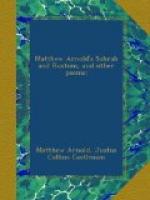=146-150. Prince Alexander, etc.= Alexander III., surnamed “The Great” (356-323 B.C.), was the most famous of Macedonian generals and conquerors, and the first in order of time of the four most celebrated commanders of whom history makes mention. In less than fifteen years he extended his domain over the known world and established himself as the universal emperor. He died at Babylon, his capital city, at the age of thirty-three, having lamented that there were no more worlds for him to conquer. (For the boundaries of his empire, see any map of his time.) Pope spoke of him as “The youth who all things but himself subdued.” =Soudan= (l. 149). An obsolete term for Sultan, the Turkish ruler.
=153-224=. The story of Merlin, King Arthur’s court magician, and the enchantress Vivian is one of the most familiar of the Arthurian cycle of legends. =Broce-liande= (l. 156). In Cornwall. See l. 61, Part I. =fay= (l. 159). Fairy, =empire= (l. 184). That is, power; here supernatural power. =wimple= (l. 220). A covering for the head. =Is Merlin prisoner=, etc. (l. 223). Merlin, the magician, is thus entrapped by means of a charm he had himself communicated to his mistress, the enchantress Vivian. Malory has Merlin imprisoned under a rock; Tennyson, in an oak:—
“And in the hollow
oak he lay as dead
And lost to life and use and name and fame.”
—Merlin
and Vivian.
[175]
=224=. For she was passing weary, etc.
“And she was ever passing
weary of him.”
—MALORY.
PART I. What is the opening situation in the poem? Why have it a stormy night? What does Tristram’s question (l. 7) reveal of his condition physically and mentally? What is the office of the parts of the poem coming between the intervals of conversation? How is the wounded knight identified? How the lady? Follow the wanderings of the sleeping Tristram’s mind. Are the incidents he speaks of in the order of their occurrence? Explain ll. 102-103; ll. 161-169. Tell the story of Tristram and Iseult of the White Hands. What is shown by the fact that Tristram’s mind dwells on Iseult of Ireland even at the time of battle? How account for his wanderings? For his morose frame of mind? What change has come over nature when Tristram awakes? Why this change? What is his mood now? Account for his addressing Iseult of Brittany as he does. Why his order for her to retire? What is her attitude toward him? Note the manner in which the children are introduced into the story (ll. 324-325) PART II. Give the opening situation. Discuss the meeting of Tristram and Iseult. What is revealed by their conversation? What is the purpose in introducing the Huntsman on the arras? PART III. What is the purpose of ll. 1-4? Give the opening situation in Part III. How is Iseult trying to entertain her children? What kind of a life does she lead? Discuss ll. 112-150 as to meaning and connection with the theme of the poem. Tell the story of Merlin and Vivian. Why introduced? Compare Arnold’s version of the story of Tristram and Iseult with the version given in the introductory note to the poem.




